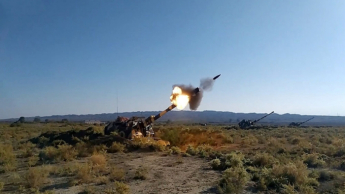Alan Kafruny: Russia’s invasion of Ukraine has consolidated U.S. economic and political leadership within the transatlantic space - INTERVIEW

Alan Kafruny, Professor of International Relations, Hamilton College (USA) gave an exclusive interview to Baku Tribune.
- Seymour Hersh, an American publicist specializing in investigative journalism, wrote in his article that the decision to conduct the Nord Stream operation was made personally by US President Joe Biden. Why did the US blow up Nord Stream, what is behind this step? Why is it beneficial for the US?
While Hersh does not provide evidence, his claims are plausible and compelling, especially in light of numerous statements from U.S. officials indicating that, in Joe Biden’s words, “we will bring an end to it” and the fact that the United States is clearly the main geopolitical and economic beneficiary of the operation.
For decades the United States strongly opposed first German-Soviet and then German-Russian energy cooperation. As the United States emerged as the world’s largest producer of natural gas following the advent of fracking, its LNG companies sought to replace Russian gas exports to Europe—and especially Germany--with higher-priced American “freedom gas.” While the Biden administration resisted enforcing sanctions on Nordstream until February 2022 in order to maintain good relations with Germany, the war and subsequent sabotage of Nordstream has opened up lucrative European markets for American LNG.
- What does the Nord Stream explosion mean in terms of US-EU relations? What will be the consequences?
- Russia’s invasion of Ukraine has consolidated U.S. economic and political leadership within the transatlantic space and especially in relation to Germany. NordStream-2 represented a “red line” for German industry, whose competitiveness will be substantially diminished as cheap Russian gas is replaced with more expensive U.S. LNG. Indeed, the rupture of German-Russian energy relations now calls into question the fundamental economic developmental project of the Federal Republic, as widely recognized by German industrialists. At the same time, many European countries opposed NS-2, including the Baltic states and Poland, which have already constructed LNG terminals. Norway is another beneficiary as the sabotage took place three days before the commencement of the Baltic Pipe connecting Norway to Denmark and Poland.
European –and especially German—business leaders may press for a resumption of energy relations with Russia if and when the war in Ukraine comes to an end. However, even if Germany (and Russia) wished to restore their relations, following its decades-long crusade against the pipeline and congenital resistance to Ostpolitik, Washington will not easily relinquish its geopolitical and commercial spoils.
- Leaks in the Nord Stream and Nord Stream 2 gas pipelines resulted in the release of approximately 7.5 million tons of carbon dioxide equivalent. What environmental threats does this pose?
- The sabotage certainly represents an environmental crime, indeed described by NATO as a “deliberate, reckless, and irresponsible act of sabotage.” The methane leak will cause serious problems in the Baltic sea region, but in itself it is not expected to add significantly to global warming.
- According to Hersh, the aggressive US policy, including the expansion of NATO, the idea that Ukraine will join NATO, caused concern and makes Russia's special military operation in Ukraine justified. Why, despite this, NATO is increasingly involved in the military support of Ukraine?
- Ever since the early 1990s the United States has pursued a project of NATO expansion, which it sees as essential to American global hegemony, now increasingly so in the context of deepening U.S.-China rivalry. Stronger U.S. leadership is clear with respect to the aforementioned transformation of energy relations, but also in terms of the growing integration of the European and American military industrial complexes resulting from expansion of European military budgets. At the same time, the war has served to extinguish the memories of costly “forever wars” in Iraq and Afghanistan, reestablishing the primacy of neoconservatives in Washington as well as European capitals.
- How is Russia's special military operation in Ukraine assessed a year later? Why does the EU not negotiate, while the US provokes Kyiv "to the last Ukrainian"? What will be the consequences of this?
- The terrible consequences of the war are of course most evident for the Ukrainian people but also for Russia, with massive casualties on both sides and the prospect of a bloody war of attrition resembling World War I, with no end in sight. Negotiations are morally and politically imperative. However, in retrospect it has become evident that neither Germany nor France, nor Zelensky were sincere in their declarations of support for Minsk II, which arguably still provides at least the basic contours of a negotiated settlement.
Moreover, although seldom reported in the Western media, former Israeli Prime Minister Naftali Bennett recently said of ceasefire negotiations in March 2022 that he mediated that the US “blocked” them. Turkish Foreign Minister Mevlut Cavusoglu, who also participated, reported that “There are countries within NATO who want the war to continue…they want Russia to become weaker.” Zelensky himself would face intense pressures from nationalists if he renounced his maximalist demands, including the return of Crimea, and would thus require massive political support from Washington.
Notwithstanding these obstacles, it is possible that Paris and Berlin might eventually seek a return to negotiations as they recognize the costs of war for their own economies. A similar situation might apply to Washington, even as it is now bathed in (proxy) war fever. Having approved more than $113 billion in economic and military aid to Kyiv, congressional resistance to future expenditures is anticipated. Declaring that the war will only end with negotiations Chairman of the joint chiefs of staff Mark Milley has recently declared that "It will be almost impossible for the Russians to achieve their political objectives by military means” and that it will be "very, very difficult" for Ukraine to expel all Russian forces from occupied territory.” By calling only for a return to pre-February 24 borders multiple US officials including Antony Blinken have recognized that Crimea will remain at least de facto with the Russian Federation.
The Rocket and Artillery formations of the Azerbaijan Army conduct live-fire exercises in accordance with the combat training plan for 2021, the Ministry of Defense of Azerbaijan told Baku Tribune.
LAST NEWS






.jpg&h=67&w=67&zc=1&q=100)













